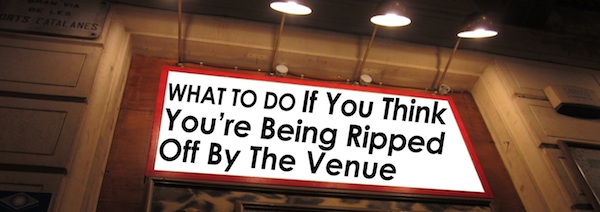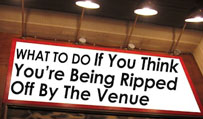
By David Barber
Sooner or later every musician who plays a lot of gigs will have this problem. You play a show, but then when you go to settle up with the venue manager he gives you a whole lot less money than you were expecting. What can you do? Should you do anything? Here are some tips based on my years of experience paying bands.
1. Open communications: Calmly tell the manager (or whoever) that this is not what you were expecting and request an explanation. The venue probably pays bands all the time, so this is nothing more than a simple business transaction for them. If you treat it the same way, then you can have a conversation about the payment and hopefully clear up any misunderstandings.
2. Always have a contract: If you have any kind of agreement in writing and available to show the person who is paying you, a lot of time can be saved. A formal signed contract is not always needed, and many venue bookers won’t sign one anyway. However, an email that says, “Yes. We will pay you $300 for this gig,” or something to that effect from the venue’s booking person, will work. If you have a contract and the venue still refuses to pay, you may have grounds for a lawsuit.
3. Make sure you understand the agreement or contract: Sometimes there’s a miscommunication between whoever booked the gig (on the band’s behalf) and the person who collects the money. Make sure you understand the difference between “They’re going to pay you $300” and “They’re going to pay you $300 if 100 people show up.” If possible, have the person who agreed to the deal be the one who collects the payment for you. This is the most common kind of misunderstanding that happens. I’ve seen band “managers” download a contract from the Internet that was so convoluted even he couldn’t understand it when he tried to get paid. If you don’t understand any part of the contract, don’t sign it. Also, make sure you know ahead of time if the venue is likely to keep money to pay the sound guy(s), the light guy, the security guys, the opening acts or anyone else.
4. Try to resolve the situation that night: Some venues have a policy where any band that doesn’t stick around to get paid at the end of the night, doesn’t get paid at all. Others will gladly let you pick it up the next day. Make sure you know what the policy is before you leave the premises. If you are on the road, coming back the next day might not be possible. Make sure you get as much money as possible before you leave.
5. Evaluate the gig: Did an audience show up? Did they show up for you? How do you know? Are there exceptional circumstances? Did it snow six feet the day of the show? Was there a line of people down the street waiting to get in to see your band? Did you start and stop on time? Were you an opening act? A headliner? Did you play the whole night by yourself? Any of these things could factor into the amount you get paid.
If nobody showed up to see you play, the venue didn’t make any money off you. So asking them to pay a large guarantee can be like asking them to flush a case of Jäger down the toilet.
6. Don’t piss them off: If you yell, make a scene or threaten the person who is supposed to pay you, he is less likely to be cooperative. Likewise, if you are drunk or high, you may not be in the best position to discuss the facts with the venue or promoter representative. In this case, you might consider sending someone else in to collect, or come back to settle up tomorrow. (See #4)
7. Talk to the right person: Chances are good that the venue or promoter/ booker is not the same person who will be paying you at the end of the night. You may be settling up with a bartender, door guy, sound guy or even a waitress. Many booking people work during the day and then leave notes for the bar manager (or whoever) about what to pay you. Sometimes there is a misunderstanding on their end. If you think it will help, don’t be afraid to call the booking guy (or ask the manager to do so) and have him talk to the person paying you.
8. Be reasonable: If nobody showed up to see you play, the venue didn’t make any money off you. So asking them to pay a large guarantee can be like asking them to flush a case of Jäger down the toilet. If they offer you half, with the explanation that they are losing money, it may be worth accepting it and chalking it up to bad luck. The alternative is to demand your full guarantee—and expect that they will never book you again.
9. Go public: If you have tried everything—you talked to them the night of the show, you talked to them again the next day and you have an agree- ment of some sort that still hasn’t been honored—tell the world. Most music venues don’t want the kind of bad publicity that comes from bands bad-mouthing them. I’ve seen bands get paid within 24 hours of using this tactic. But be careful. If you are too aggressive, they might just sue you for slander. On the other hand, if you are dealing with a fly-by-night promoter who vanished before the show even ended, this is a good way to make sure none of your friends in other bands gets ripped off by the same guy.
10. Take them to court: This is a last resort. It is a lot of work to take anyone to small claims court and there is no guarantee you will win. On the upside, the threat of a lawsuit in a letter from a lawyer might be enough to get you paid, but you will have to pay a lawyer to write it. If a judge finds in your favor, you may be entitled to triple the amount they owe you. On the downside, make sure you are okay with never playing for that venue/ promoter ever again. If the venue is being booked by a national or regional entity (think Live Nation, AEG or Hard Rock) you may never get to play any of their venues again. And if you’re going after a shyster who is out to rip off bands, then even if you win in court you may never collect what he owes you. (See MC's Music Attorneys Directory in this issue.)
miniBIO: David A. Barber is the author of Gigging: Everything You Need To Know About Playing Gigs (Except how to play your axe). He is also co-producer of Band Talk every Wed. on Indie104.com, webmaster of rockoncolorado.com, Board Member of the non-profit Colorado Music Business Organization and a seasoned professional who has worked at several Denver, CO area music venues.











